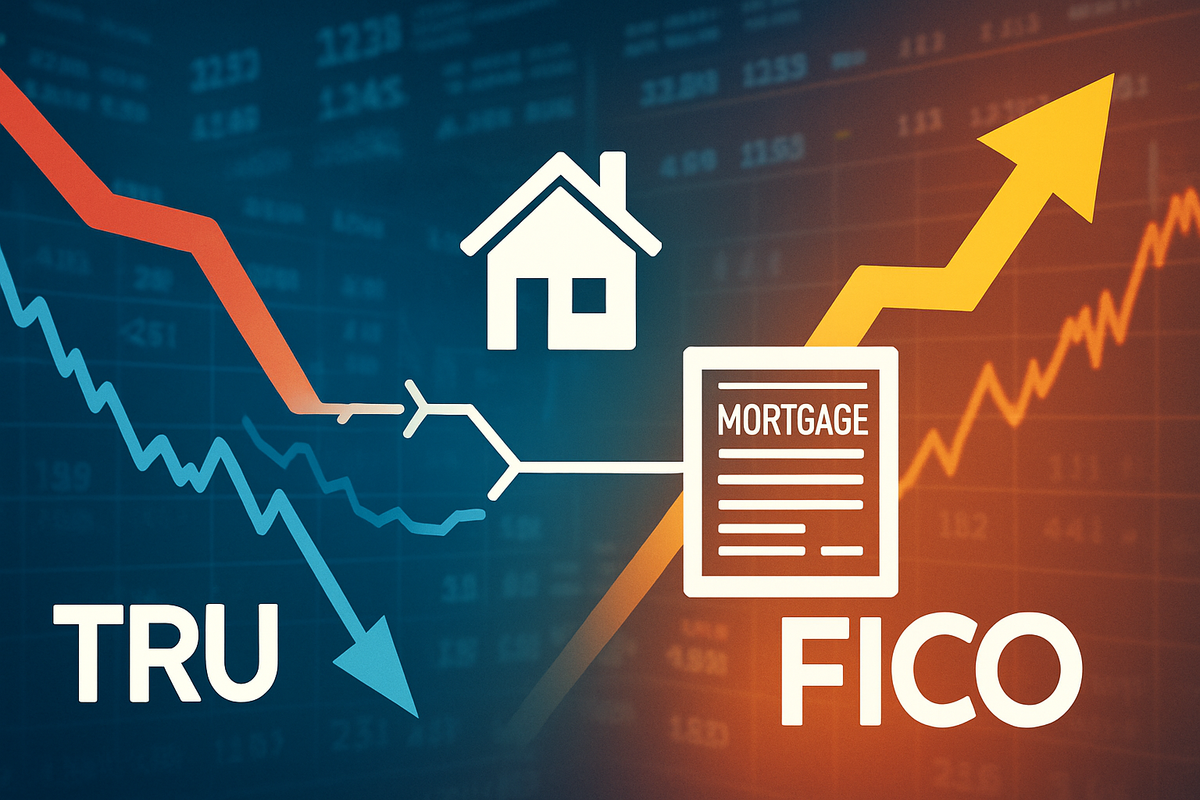
TransUnion (NYSE: TRU) shares experienced a significant downturn today, October 2, 2025, with a sharp decline of approximately 12.5%. This dramatic drop was triggered by Fair Isaac's (NYSE: FICO) strategic launch of a new direct pricing option for mortgage lenders, a move that directly challenges the traditional revenue streams of major credit reporting agencies. The market's immediate reaction underscores the perceived threat to the established order within the credit reporting industry.
Fair Isaac's innovative "FICO Mortgage Direct License Program" is poised to reshape how mortgage lenders access crucial FICO Scores, potentially bypassing the intermediary role historically played by credit bureaus like TransUnion. This development has sent ripples throughout the financial markets, prompting investors to re-evaluate the long-term profitability and market positions of the affected companies.
Fair Isaac's Bold Stroke: Reshaping Mortgage Credit Access
Fair Isaac's "FICO Mortgage Direct License Program," which became effective on October 1, 2025, marks a pivotal moment in the mortgage lending landscape. This program empowers mortgage lenders and tri-merge resellers to license FICO Scores directly from Fair Isaac, effectively cutting out the traditional role of credit bureaus as intermediaries. The initiative introduces two new pricing structures designed to enhance transparency and reduce costs for lenders.
The first option, a performance-based model, features a royalty fee of $4.95 per score, representing a 50% reduction from average fees previously paid to tri-merge resellers. Additionally, a $33 funded-loan fee per borrower per score applies upon the closing of a FICO-scored loan, replacing former re-issuance charges. Alternatively, lenders can opt for a per-score model at $10 per score, mirroring the average price historically charged by credit bureaus. Fair Isaac asserts that this program aims to introduce greater price transparency, foster competition, and drive cost efficiencies in the mortgage lending process by eliminating "unnecessary mark-ups" imposed by credit bureaus.
The implications for major credit agencies are profound. Previously, credit bureaus served as the primary conduit for lenders to access FICO scores, adding their own margins to the cost. By enabling direct licensing, Fair Isaac effectively removes a significant revenue stream and profit margin for these bureaus. Analysts at Raymond James noted that this new model allows lenders to avoid an approximate 100% markup that credit bureaus typically applied to FICO scores. Citigroup analysts echoed this sentiment, suggesting the direct licensing would "cut out the margin that the likes of Experian and Equifax make on the FICO credit score itself." Industry experts estimate that this change could impact credit bureau earnings by an average of 10% to 15%.
The market's immediate reaction on October 2, 2025, was stark. While TransUnion, Equifax (NYSE: EFX), and Experian (LSE: EXPGY) shares plunged, Fair Isaac's (NYSE: FICO) stock soared, with gains reported between 14.63% and an impressive 32% on the day, reaching new highs. This dramatic divergence highlights a clear shift in investor confidence, favoring Fair Isaac's strategic repositioning within the industry. The broader market on October 2, 2025, saw mixed performance, but the FICO announcement was undeniably the dominant factor reshaping the financial services sector.
Winners and Losers: A Shifting Landscape
Fair Isaac (NYSE: FICO) emerges as the clear winner in this strategic maneuver. By offering direct licensing of its proprietary FICO Scores, the company strengthens its control over its core product, captures a larger share of the revenue generated from its scores, and enhances its market position. This move also addresses long-standing industry demands for pricing transparency and potentially pre-empts future regulatory scrutiny regarding its historical pricing practices. The significant surge in FICO's stock price reflects strong investor confidence in the long-term benefits of this strategy.
Conversely, major credit reporting agencies like TransUnion (NYSE: TRU), Equifax (NYSE: EFX), and Experian (LSE: EXPGY) are the immediate losers. Their stock prices plummeted as investors reacted to the erosion of a significant revenue stream. These companies have historically profited from their role as intermediaries in the distribution of FICO Scores to mortgage lenders. With lenders now able to bypass the bureaus, a substantial portion of their mortgage-related revenue and profit margins is at risk. The competitive threat is not merely about lost revenue; it also forces these companies to re-evaluate their value proposition and potentially accelerate diversification efforts.
Beyond the direct impact on these key players, other companies within the financial technology (FinTech) and mortgage industries may experience ripple effects. Technology providers that facilitate direct data exchange or offer alternative credit assessment tools could see increased demand. Mortgage lenders, on the other hand, stand to benefit from reduced costs and increased pricing transparency, which could lead to more competitive loan offerings for consumers.
Wider Significance: Industry Transformation and Regulatory Scrutiny
This event is not an isolated incident but rather fits into broader industry trends emphasizing transparency, cost reduction, and direct access to data. The financial services sector has been undergoing a digital transformation, with many traditional intermediaries facing disruption from technology-driven solutions. Fair Isaac's move aligns with this trend, empowering lenders with more direct control over their credit score acquisition.
The potential ripple effects on competitors and partners are substantial. Other credit scoring models or alternative data providers might see this as an opportunity to gain market share, especially if credit bureaus struggle to adapt. Furthermore, the increased competition could spur innovation in credit assessment, leading to new products and services that offer more granular or inclusive evaluations of creditworthiness. This could also intensify the ongoing debate around data ownership and access within the financial ecosystem.
From a regulatory perspective, Fair Isaac's initiative could be seen as a proactive step to address concerns about the lack of transparency and potential anti-competitive practices within the credit reporting industry. Regulators have long scrutinized the pricing structures and market dominance of the major credit bureaus. By offering a direct licensing option, Fair Isaac could be positioning itself as a more consumer- and lender-friendly entity, potentially mitigating future regulatory interventions. This event also sets a precedent for how other proprietary data providers might choose to distribute their information, potentially sparking similar direct-to-customer models in other financial sectors.
What Comes Next: Adaptation and Innovation
In the short term, TransUnion, Equifax, and Experian will likely focus on damage control and strategic adjustments. This could involve exploring new revenue streams, enhancing their proprietary credit scoring models, or offering differentiated services that go beyond mere FICO Score distribution. There may also be increased lobbying efforts to influence regulatory discussions surrounding credit data access and pricing. Investors will closely watch for any announcements regarding new partnerships, acquisitions, or product launches aimed at mitigating the impact of Fair Isaac's move.
Long-term possibilities include a more fragmented credit scoring market, where lenders have a wider array of options beyond the traditional credit bureau offerings. This could foster greater innovation in credit assessment, potentially leading to more accurate and inclusive evaluations of credit risk. Credit bureaus may need to pivot their business models to focus more on value-added services such as fraud detection, data analytics, and identity protection, rather than relying heavily on their role as FICO Score distributors.
Market opportunities could emerge for FinTech companies that can provide seamless integration of direct FICO Score access for lenders or develop alternative, robust credit scoring solutions. Challenges will undoubtedly arise for the incumbent credit bureaus, requiring significant strategic pivots and adaptations to maintain relevance and profitability in a rapidly evolving landscape. Potential scenarios range from a gradual erosion of credit bureau market share to a more aggressive restructuring of the entire credit reporting ecosystem.
Wrap-Up: A New Era for Credit Reporting
Fair Isaac's direct licensing program for mortgage lenders marks a significant turning point for the credit reporting industry. The immediate plunge in TransUnion's stock price, alongside those of its peers, underscores the profound impact of this strategic shift. Key takeaways include the increased power of proprietary data providers like Fair Isaac, the heightened competitive pressure on traditional credit bureaus, and the growing demand for transparency and cost efficiency in financial services.
Moving forward, the market will be keenly observing how TransUnion and its competitors respond to this challenge. Their ability to innovate, diversify, and adapt their business models will be crucial to their long-term success. Investors should watch for strategic announcements, earnings reports, and any further regulatory developments that could shape the future of credit reporting. This event signals a new era for credit assessment in mortgage lending, one characterized by increased directness, competition, and a renewed focus on value for lenders and consumers alike.
This content is intended for informational purposes only and is not financial advice






